Giáo trình Speaking 1
SPEAKING I: STUDY GUIDE
GENERAL INTRODUCTION
This study guide hopes to assist the learners more in improving their spoken English
when studying the course books Well Spoken by Ramsey and Rees-Parnall (1989) and
Something to Say by Wilson (1984) by themselves. As Well Spoken is a theme-based
speaking textbook, all the activities and exercises chosen in this study guide are to
a) help the learners to equip themselves for talking about a topic
b) enlarge vocabulary to talk about a topic
c) guide the learners to study on their own or with others out of the classroom
Something to Say helps the learners with the language needed to improve their
speaking skill and focuses on developing the fluency by providing the learners with a
variety of dialogues, role plays, situations and discussions.

Trang 1
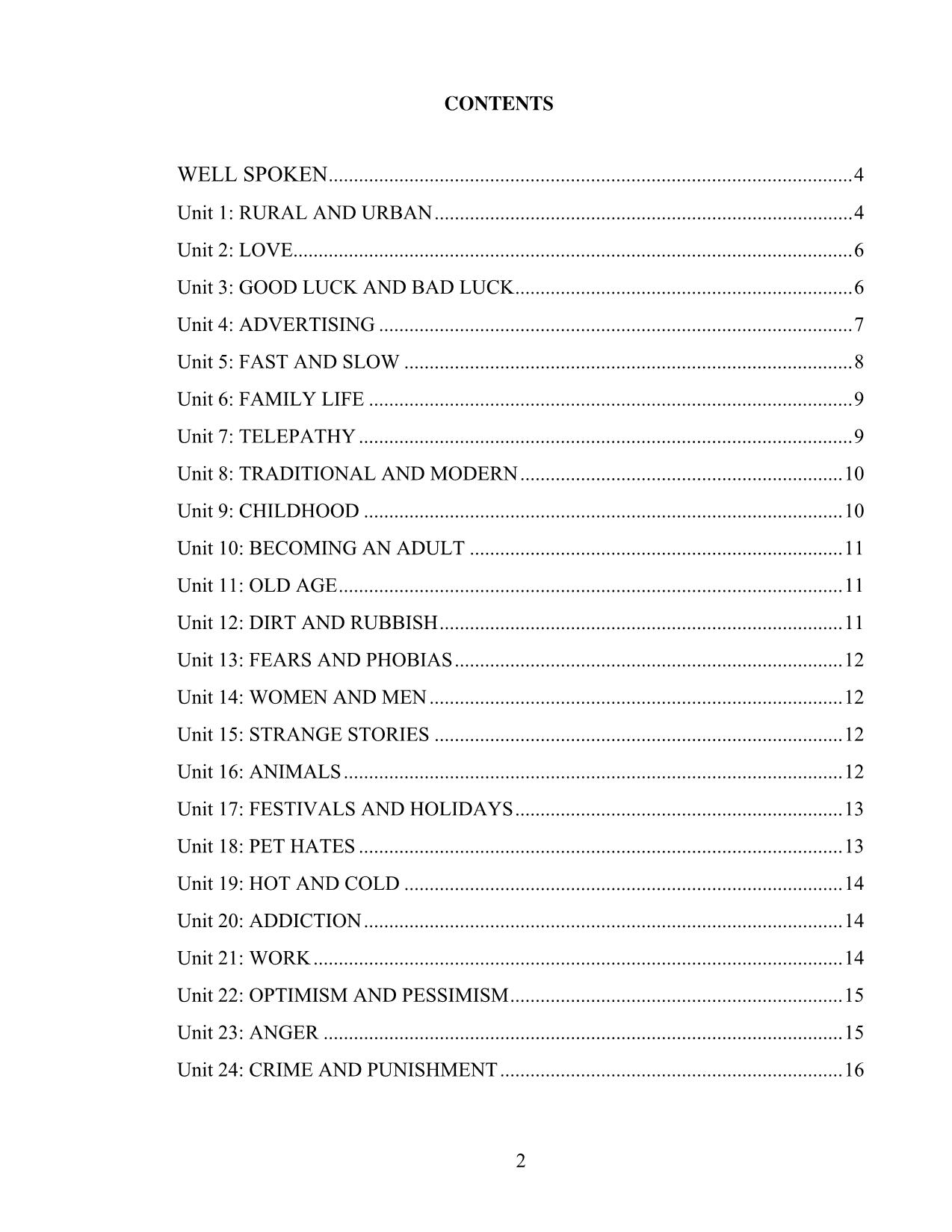
Trang 2
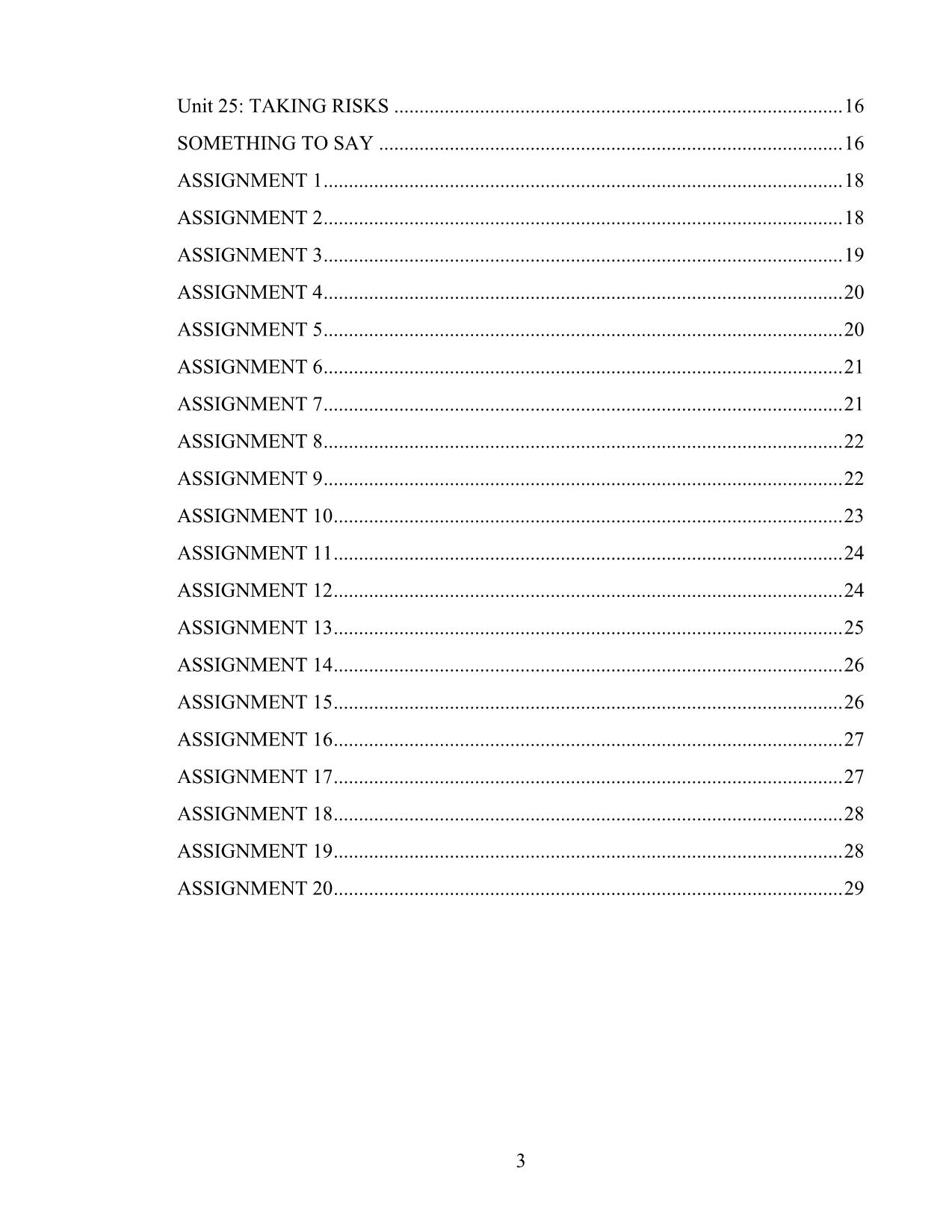
Trang 3
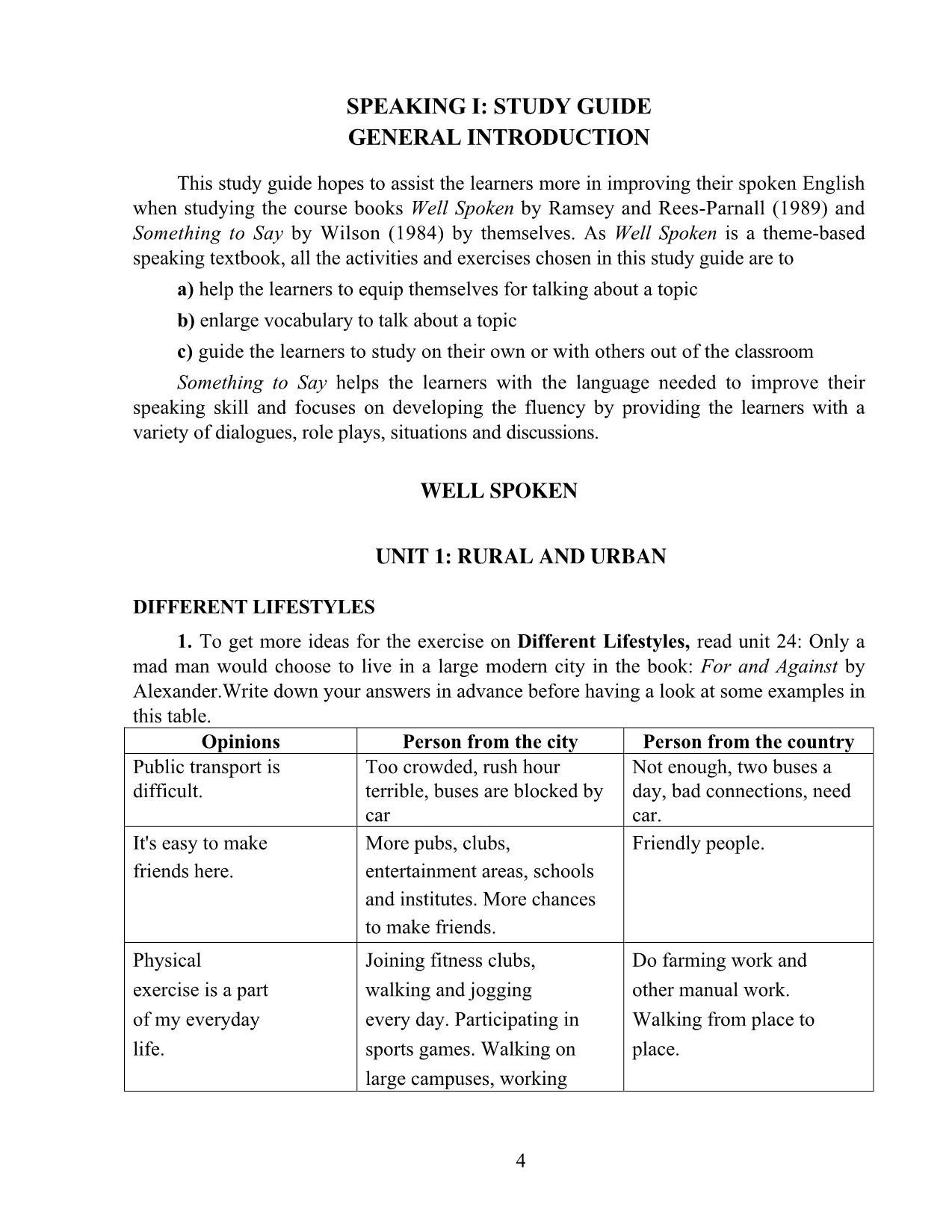
Trang 4
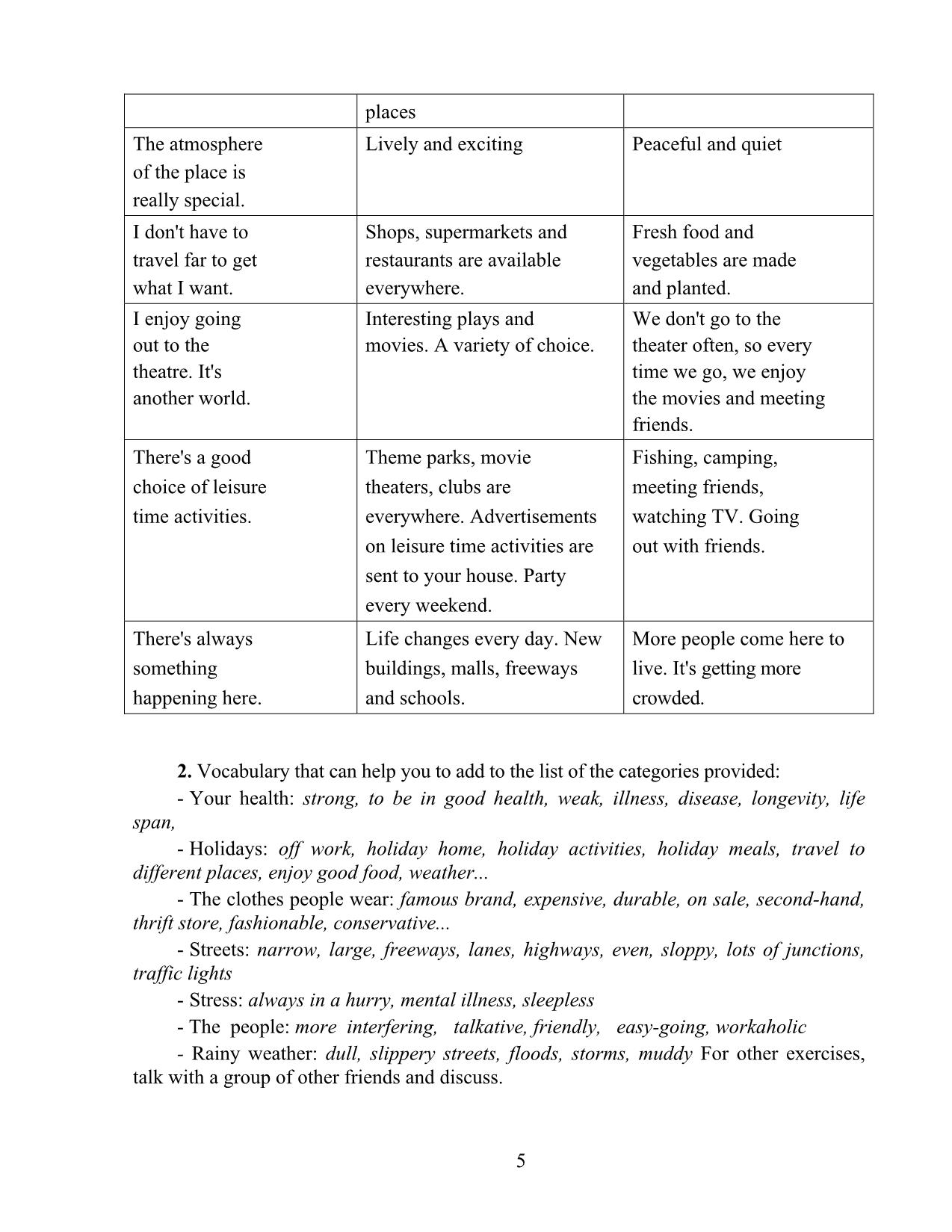
Trang 5
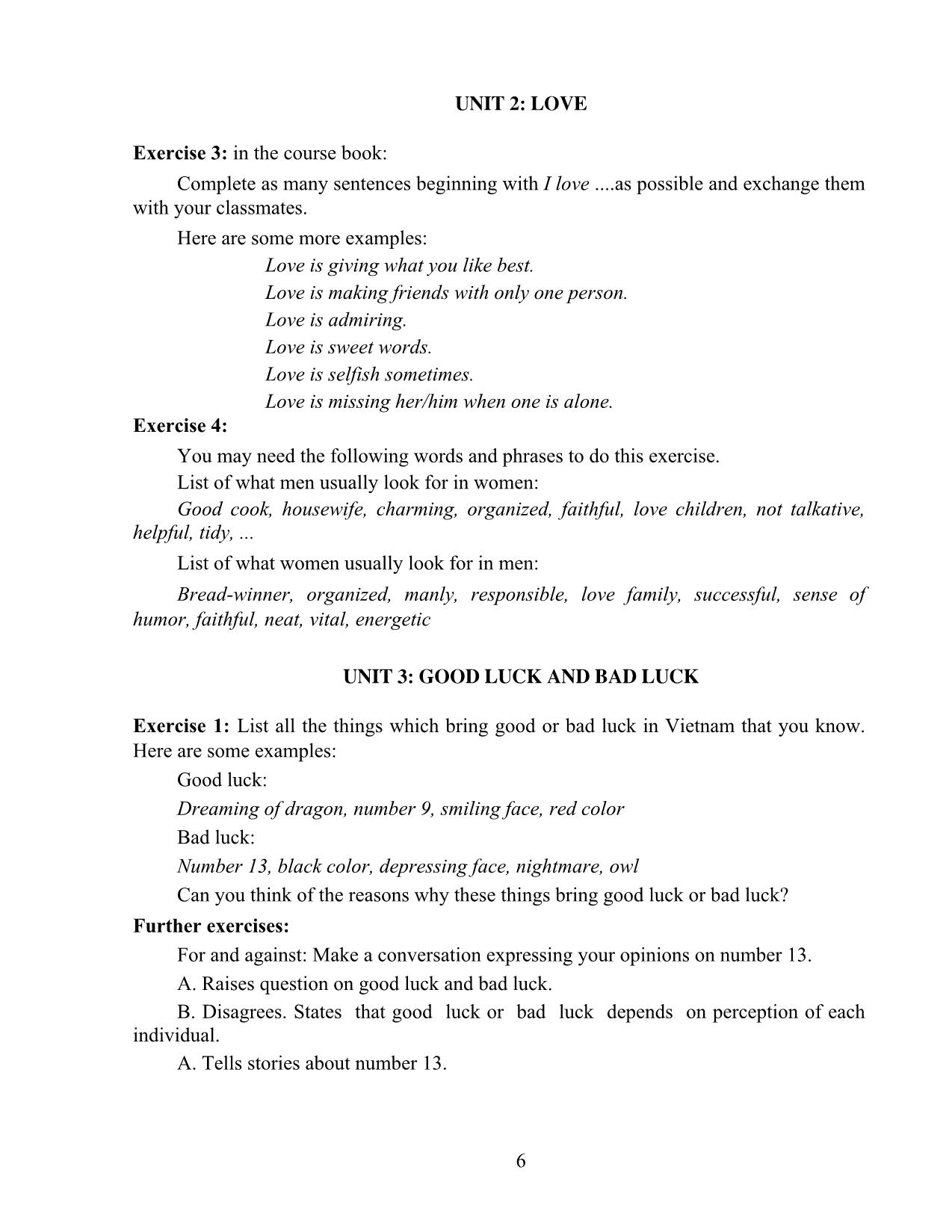
Trang 6
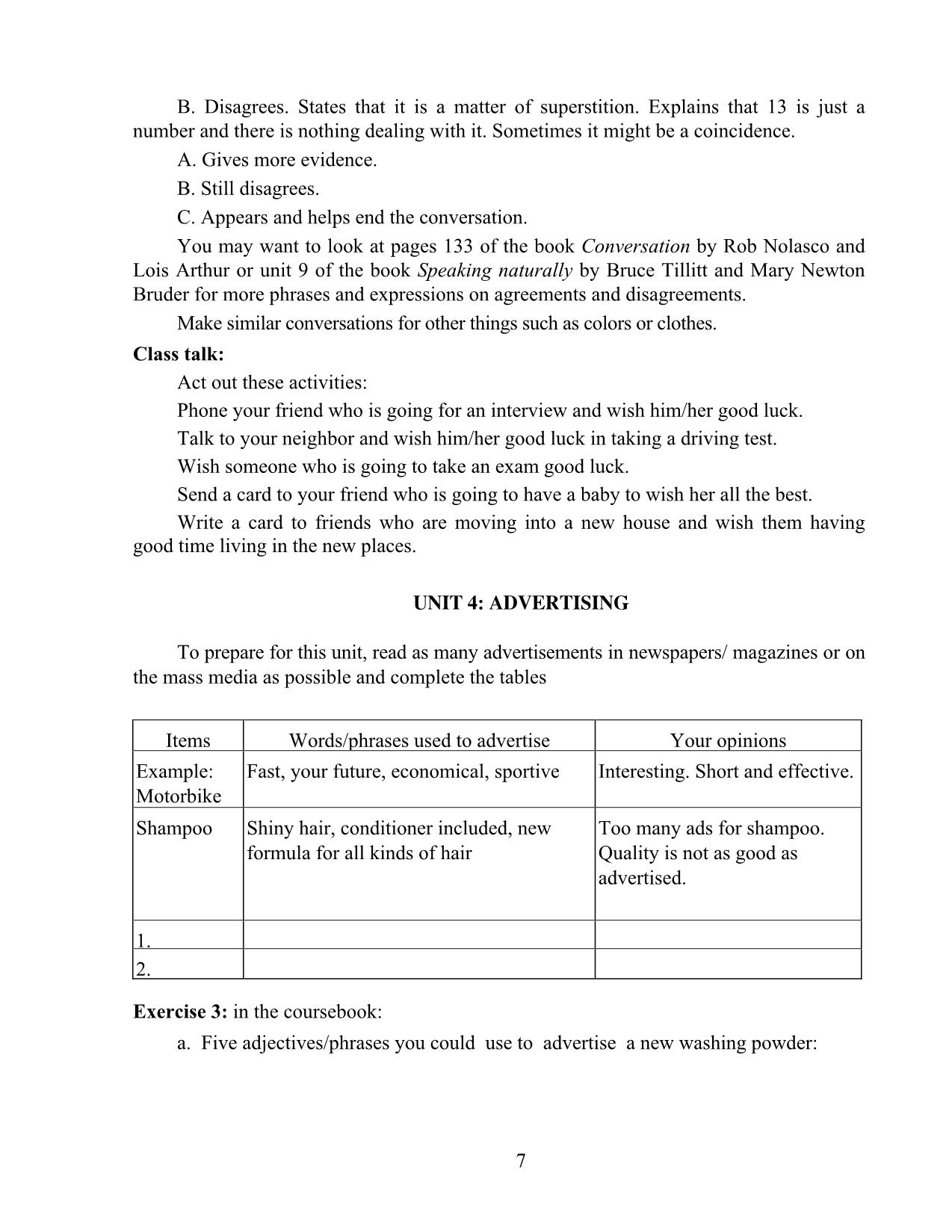
Trang 7
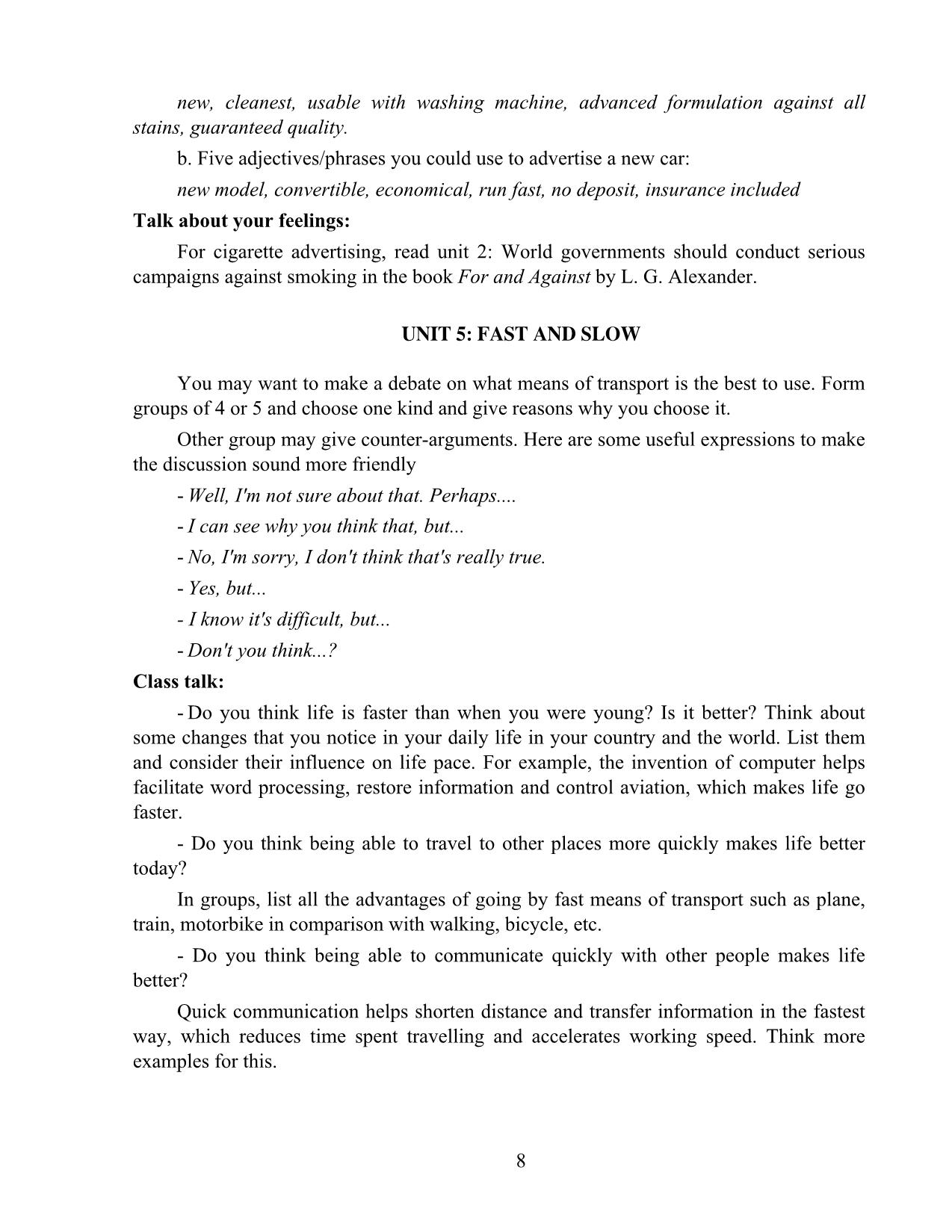
Trang 8
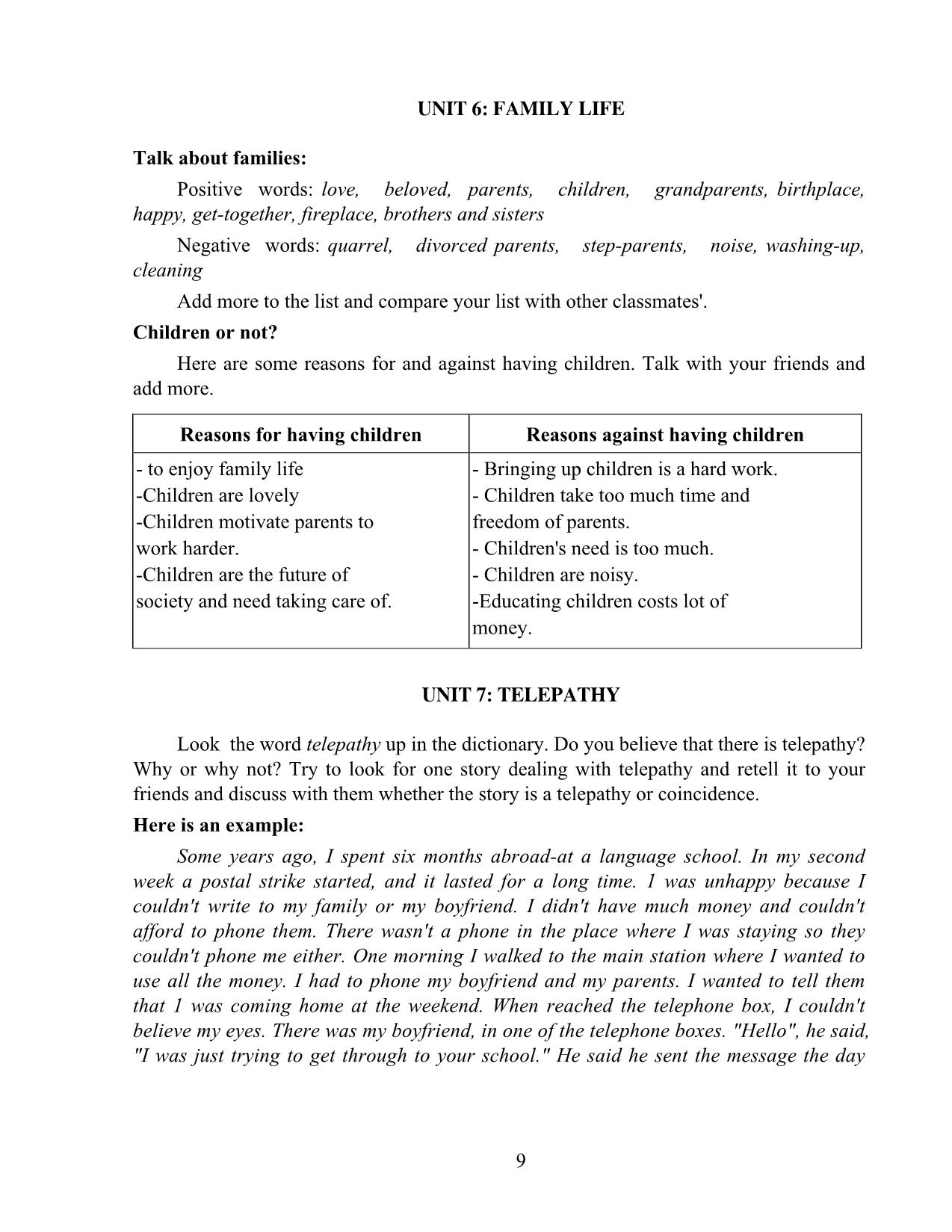
Trang 9
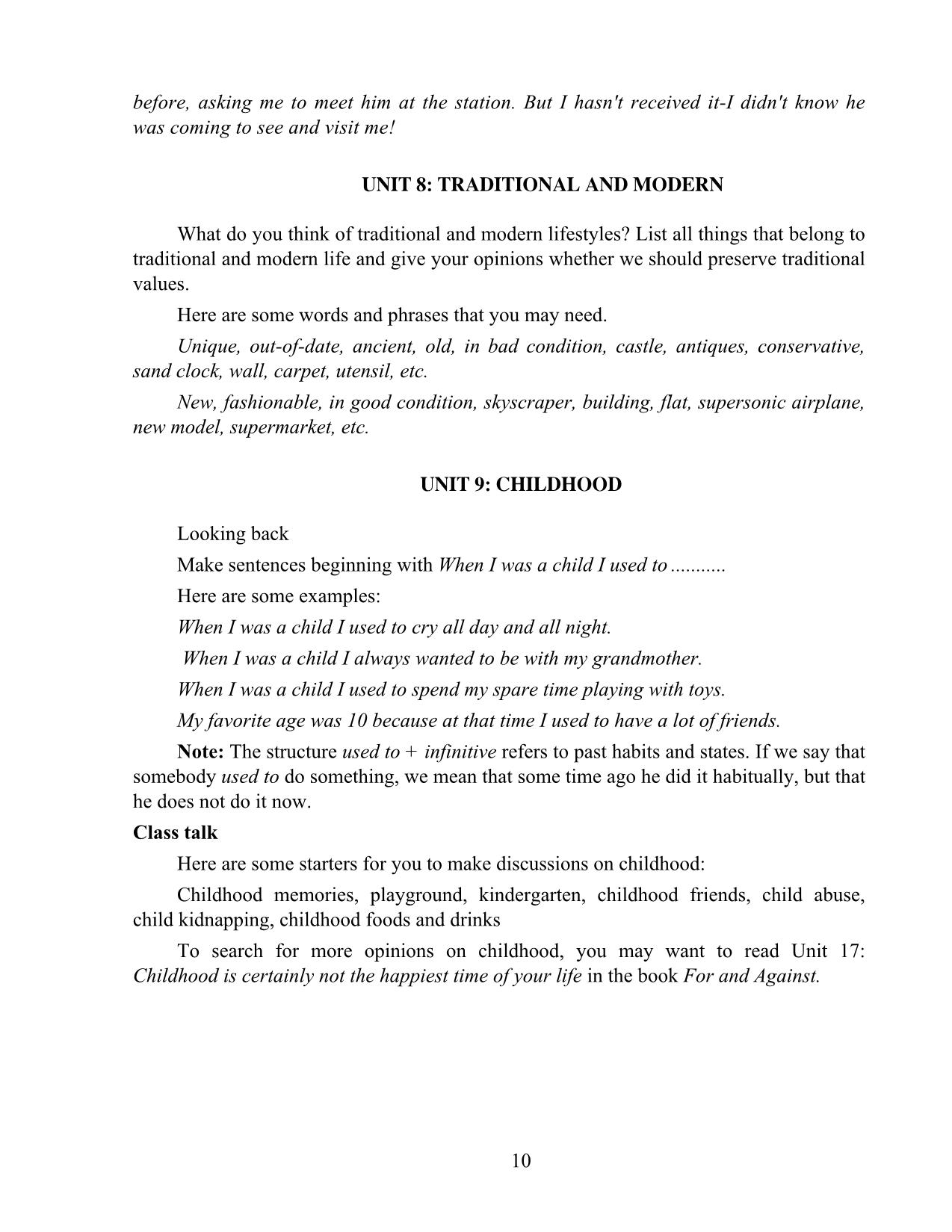
Trang 10
Tải về để xem bản đầy đủ
Tóm tắt nội dung tài liệu: Giáo trình Speaking 1

s Asks if he is using drug again Still lies Advises him to stop Insists on asking for money Threatens him 4. Your opinions on the Women's Liberation. ASSIGNMENT 4 1. Make questions: The interviewer says: "I'm a real estate agent." You want to rent an apartment. We are looking at an apartment together. Read this and ask me questions. Renting an Apartment Find out about: a. Garage? b. A television? c. School near here? d. Air-conditioning? e. Deposit? 2. Understand the questions Match the questions in the left-hand column with those that have the same meaning in the right-hand column ---What's your opinion of...? a. Is it similar to ...? ---How do you find....? b. Why ...? ---How often ....? c. How do you feel about...? ---Where ...? d. How frequently ...? ---What's the difference between ...? e. What do you think of...? ----How come? d. Whereabouts...? 3. Give counter-arguments for this opinion: It isn't possible to combine a happy family life with a successful career-for men and women. ASSIGNMENT 5 1. Ask questions for the following advertisement: Learn English in England The Royal English college in Manchester provides intensive summer courses at all levels. The college, situated near the city center, can also provide home-stay accommodation if required. For more information please write to P. O. Box 99, Manchester, UK. 2. Interview 5 foreigners in your city to find out what they like the most when visiting your city. You may want to use these sentences: What's your opinion of..? How do you feel about...? 20 21 Is there anything that disappoints you? What do you like ...? Do you enjoy....? ........................................................................ 3. What period of life do you like the most? Explain? ASSIGNMENT 6 1. Study the following situations. What questions would you ask the person in each situation? A foreigner has just arrived in your country. A friend tells you that she/he is planning to study English at your university. You meet a person who works for a travel agency. A friend has returned from a trip to the United States. Try to ask as many questions as you can and then answer them. 2. Role-play A, B, and C, all psychology students are discussing the best way to raise children. A is in favor of a strict, authoritarian upbringing, whereas C favors a permissive, relaxed method. B prefers to combine both perspectives, depending on the situation. Useful expressions A B C firm discipline firm but kind guidance child's rights spare the rod and spoil teach self-control can't confuse the child by the child balance is needed acting unpredictably must be consistent 3. Childhood is the best time of your life. Do you agree with this opinion? ASSIGNMENT 7 1. You have arrived in London for the first time. You go to a Tourist Information Center. I am working at the information desk in the Center. Ask me as many questions as possible. Read this first. It will help you to form questions. A Visit to London Find out about: a. hotel accommodation d. city sights b. price of accommodation e. entertainment facilities c. distance from the city center f. transport 2. Interview 5 of your friends to find out whether they like to live in the city or in the country. 3. Your opinion of keeping pets. ASSIGNMENT 8 1. What questions are the reporters asking? A strange creature who can speak and understand English is in town. Use as many Wh-questions as possible to ask him. Examples: Which planet are you from? Why did you come to earth? 2. Imagine that you are an inexperienced reporter interviewing a famous person. Role-play the interview with a partner. Be very polite. Useful expressions: I'd like to ask you... Could you tell me .... Would you mind telling me.... ....................................................................... 3. Your plans for your old age. ASSIGNMENT 9 1. Imagine that you are talking on the phone to a friend. Unfortunately it's a bad connection, so you can't hear everything your friend says. Ask him/her questions to find out the information missing. Example: My plane arrives at ...................p.m. Question: What time/when does your plane arrive? Hi! Listen: next month I'm going to ............... . Well. I wrote to.................and she asked me to visit her. The only problem is that I have to be back home on........ The ticket's really cheap: it only costs..................round trip!................... said she'd meet me at the airport. While I'm there I'd like to go to............... I've always wanted to go there because.................... According to the airline, there are still...........seats left. The flight leaves on the...........and the return flight is on the.................. If you can come, you could bring...................................with you. 22 23 2. Discuss these questions What did people use to do before they had television? How did they spend their free time? How has TV changed people's lives? Without TV, how would your own life be different? How will TV continue to change people's lives in the future? 3. The world is getting noisier. Do you agree with this opinion? ASSIGNMENT 10 1. Make questions for the following sentences: a. Is it necessary for me to attend every class? Do I ------------------? b. Can I bring my dog to class? Is--------------------------------------- ? c. Could I leave early today? Would------------------------------------? d. Could you pass out these books please? Would-------------------- ? 2. Imagine that you are talking to a foreigner who is going to visit your country for the first time. Think of questions a foreigner might ask. Give advice about the habits a foreigner would have to get used to. Useful expressions: You don't have to ... You can't... There's no need to ... You don't need to ... You have to... You've got to... You ought to... It's a good idea to ... Make as many sentences using the useful expressions above as you can to take about these things: Getting into the country Transportation Shopping Eating Social behavior Language Gestures 3. Give counter-arguments for this opinion: Advertising is a waste of money. ASSIGNMENT 11 1. Talk about your day routine. What do you do first in a day? What do you do next? Example: First, I get up. Compare your day routine with that of your friend or family member. 2. Cued dialogue A and B are neighbors. They meet on the street and begin to talk about nuclear energy. A B greets B greets A, asks about A's family says son, Randy, is working in a asks what he will be doing nuclear plant describes Randy's position expresses surprise, introduces the subject of nuclear energy and its dangers agrees that it is a problem, suggests disagrees politely with A's a solution opinion, gives own opinion expresses doubt, asks for more gives further explanation/more information information gives tentative agreement gives pre-closing replies to pre-closing says good-bye says good-bye 3. How do you understand this saying, "A friend in need is a friend indeed". ASSIGNMENT 12 1. What would you reply to these statements? Example: I'm going out in the rain. But if you go out in the rain, you'll get wet. a. I'm going to drink two whole liters of milk. b. I'm going to drive as fast as I can all the way there. c. I'm going to hold my breath for ten minutes. d. I'm not going to phone home this month. e. I'm going to steal that old woman's purse. f. I'm not going to this class ever again. 24 25 g. I'm going to keep studying until my English is perfect. 2. Ask some your friends these questions and take notes of their answers. How exactly did you get to school today? What did you do last weekend? What did you do on your last vacation? How would you get from the place you're sitting now all the way to the top of the Empire State Building in New York? What's your favorite way of traveling? Why do you prefer it? 3. Do you believe in good luck and bad luck? Why or why not? ASSIGNMENT 13 1. Talk about the school rules: Look at the school rules table and make as many sentences as you can. School Rules No smoking No singing No dancing No shouting SHOW RESPECT TO TEACHERS ARRIVE NO LATER THAN 8:55 ALWAYS WRITE IN INK SPEAK ONLY ENGLISH No swearing No fighting No cheating SILENCE WHEN TEACHER IS TALKING TWO HOURS OF HOMEWORK EVERY NIGHT Useful expressions: We aren't allowed to ... They won't let us ... .... isn't allowed. They make us ... We have to ... ... is required. 2. Retell a story using the words/phrases provided discard rubbish see a lot of dollars take home show family happy report to the police return the money to its owner get a reward of $10,000 3. Imagine some plans to develop the countryside of Vietnam. ASSIGNMENT 14 1. Imagine that four new people are joining your class. What would you ask to get to know them? 2. Cued dialogue A and B are good friends from school. A sees B on a new motorcycle and begins to talk with B. A B greets B returns greeting compliments B on a new motorcycle accepts compliment, tells when motorcycle was bought asks to try motorcycle agrees or refuses and gives reasons expresses thanks or expresses disappointment 3. Exercise is an important part of staying healthy. In the United States and Canada, the most popular ways to exercise include walking (22%), bicycling (13%), running/jogging (11%) and playing tennis (9%). Do you exercise? What kinds of exercise are popular in your country? Are there any more reasons for doing exercise? ASSIGNMENT 15 1. Giving direction Can you show some foreigners to get to these places in your city? bank post office railway station airport bookshop theater supermarket bus stop 2. The titles of some jobs are changing. The old names made the jobs sound as if they were only for men and only for women. The new names are the same for both males and females. Old New airline stewardess/steward flight attendant fireman fire fighter mailman letter carrier/post office clerk policeman/woman police officer salesman/woman sales clerk/sales representative Have any jobs changed names in your country? What was the reason? 3. What does this mean? Some people's rubbish is other people's treasure! Do you agree with this opinion or not? 26 27 ASSIGNMENT 16 1. Complete the following conversation: In a travel agency A: -------------------------------------- to New York, please. B: New York... A: Yes, please. B: --------------------------------------------------------------------- ? A: What's the special way? B: Well... you leave London.... A: Yes? B: You -------------------- to Tokyo and ---------- a week there... A: ------------------------------------ B: And then you fly to Honolulu for another week.... A: ----------------------------------? B: Yes, then a week in San Francisco, and then non-stop, ----- -------- to New York. A: Er... I think I'll go the normal way. B: That's what they all say. Why doesn't anyone want to go the special way? 2. Imagine you are going to interview 5 most famous persons in your country. Think about whom you should interview and what you should ask them. 3. Discuss this: Children should go to single-sex schools, wear uniforms and stay at school until they are sixteen. ASSIGNMENT 17 1. Imagine that you have various plans for tomorrow, but your plans depend on the weather and other circumstances. Follow the pattern below to talk about your intentions. Activity Depends on hike weather being good shopping having enough money concert getting tickets zoo friends wanting to go swimming water being warm dinner finding a good restaurant movies something good playing study being in good mood Example: I might go hiking if the weather's nice. And what if it isn't nice? Well, I'm certainly not going hiking unless the weather is nice! 2. You are holding a party. Think about interesting ways to introduce your 15 guests. 3. Should people in power (politicians and business people) retire at 60? ASSIGNMENT 18 1. How many ways do you know to introduce yourself in English? What else do you say when you meet someone for the first time? Example: Hi (friendly) I'm pleased to meet you. (formal) 2. Interview 5 of your classmates to find out what they did on their summer vacation. 3. Young people in most countries are interested in entertainment. In the United States and Canada, people under 25 spend about 6 percent of their income on entertainment. Of that money, about one-third is used for tickets for movies, concerts, and other events. A little more than one-third is used for things like stereos, video players, and televisions. Reading is also popular. Young people spend nearly 10 percent of their entertainment income on books and magazines. What do young people in your country like to spend money on? ASSIGNMENT 19 1. A is going to move and needs a lot of help. A talks to friend B before class that day. A B greets B greets A, asks about A's family thanks B and gives information, asks agrees to do the favor or refuses to do a favor to do the favor and gives an excuse, wishes A well thanks B, makes arrangements, gives pre-closing or thanks B, expresses regret, gives pre-closing replies to pre-closing says goodbye says goodbye 28 29 2. You are a radio news announcer. Think of a recent news story that most people know about. Tell the story. 3. Think about young people in your country. Do they often disagree with their parents? What kinds of things do parents and young people disagree about? ASSIGNMENT 20 1. Titles like Mr. , Ms., and Dr. are usually not used when you say only the person first name. You might call Tom Johnson, Mr. Johnson but not Mr. Tom. What would you call the people below? Amy Weldon (your teacher) Bill Jones (your best friend) Jane Sato (your doctor) Marie Brandon (your employer) Young Kim (a professor you met for the first time) 2. Share these memories with your partner. Ask about your partner's memories of the same occasions: trying a favorite food for the first time the first time you flew in an airplane your first conversation with an English-speaking person using a computer for the first time 3. What are the most popular ways to stay healthy? What do people in your country do to stay healthy? ChÞu tr¸ch nhiÖm néi dung: Ts. NguyÔn v¨n hßa Biªn tËp: Tæ c«ng nghÖ th«ng tin Phßng kh¶o thÝ ®¶m b¶o chÊt l−îng gi¸o dôc §¬n vÞ ph¸t hµnh: trung t©m ®µo t¹o tõ xa - ®¹i häc huÕ 30
File đính kèm:
 giao_trinh_speaking_1.pdf
giao_trinh_speaking_1.pdf

